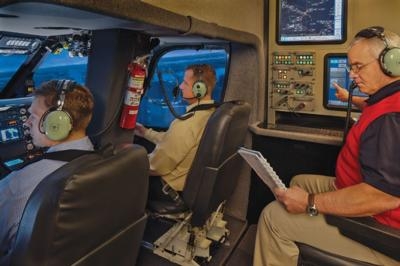Tue, Nov 01, 2016
Builds On The Fundamentals Covered By Initial And Recurrent Training
FlightSafety International announces the introduction of its Master Aviator program for helicopter pilots. The progressive Master Aviator curriculum builds upon the fundamentals covered by initial and recurrent training. FlightSafety Master Aviator for helicopter pilots is earned by completing two advanced aircraft-specific core courses and a choice of four electives. At least one FlightSafety initial or recurrent training event must also be completed every 8 months.

“We are pleased to now offer the FlightSafety Master Aviator program for helicopter pilots,” said David Davenport, Executive Vice President. “Master Aviator sets a new standard for pilot achievement and recognition, and helps pilots to develop a deeper knowledge of the helicopter they fly and to ensure a safe and correct response to a broad range of demanding, unexpected situations.”
The one-day core courses include Helicopter Human Factors / Crew Resource Management (HF/CRM) and Surviving Inadvertent Instrument Meteorological Conditions (IMC). The CRM course enables the pilots to master the key aspects of CRM that uniquely apply to helicopter operation. This includes situational awareness, conflict resolution and communication skills. They will also experience how effective crew performance and decision-making can overcome situations caused by error chains, human factors and fatigued or stressed operators.
The IMC course will help the pilots to be fully prepared when weather conditions unexpectedly and rapidly change in order to have sound and well-practiced strategy to maintain the safety of their aircraft. This course provides the tools needed to react appropriately as decisions made in the first pivotal moments often decide the outcome. Pilots will also review and fully understand the major causes for inadvertent IMC accidents and master best practices for the safest responses.
The elective courses include Helicopter/Rotary Wide Area Augmentation System (WAAS) and Automatic Dependent Surveillance-Broadcast (ADS-B); Fatigue Management; Safety Management Systems for Aviation Professionals; Air Medical Resource Management; Warm Weather Operations; Cold Weather Operations; Adverse Weather and Monsoon Conditions; Helicopter Approach and Landing Accident Reduction (ALAR); and Controlled Flight Into Terrain (CFIT). Other specialty and enrichment courses include General Emergency Training; Night Vision Goggles (NVG) Initial and Recurrent; Corporate Aviation Security; Hazardous Materials (Will Not Carry); Safety Management System (SMS) for Managers; and Weather Radar.
(Source: FlightSafety news release)
More News
“These new aircraft strengthen our ability to respond quickly, train effectively and support communities nationwide. Textron Aviation has been a steadfast supporter in helpin>[...]
From 2011 (YouTube Edition): Rugged, Legendary, STOL Twin Makes A Comeback The de Havilland Twin Otter is an airplane with a long history, and it gained a reputation as a workhorse>[...]
A Wind Gust Lifted The Right Wing And The Airplane Turned To The Left Analysis: The pilot was departing from a 2,395-ft-long by 50-ft-wide turf runway. The pilot reported that afte>[...]
Have A Story That NEEDS To Be Featured On Aero-News? Here’s How To Submit A Story To Our Team Some of the greatest new stories ANN has ever covered have been submitted by our>[...]
Braking Action Advisories When tower controllers receive runway braking action reports which include the terms “medium," “poor," or “nil," or whenever weather con>[...]
 Aero-News: Quote of the Day (12.18.25)
Aero-News: Quote of the Day (12.18.25) Classic Aero-TV: Viking Twin Otter 400--Bringing the DHC-6 Back Into Production
Classic Aero-TV: Viking Twin Otter 400--Bringing the DHC-6 Back Into Production NTSB Final Report: Rans Employee Flying Club Rans S-6ES Coyote II
NTSB Final Report: Rans Employee Flying Club Rans S-6ES Coyote II ANN FAQ: Submit a News Story!
ANN FAQ: Submit a News Story! ANN's Daily Aero-Term (12.18.25): Braking Action Advisories
ANN's Daily Aero-Term (12.18.25): Braking Action Advisories



